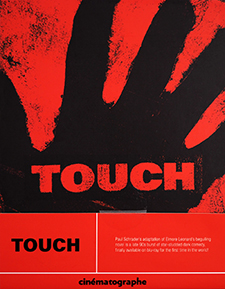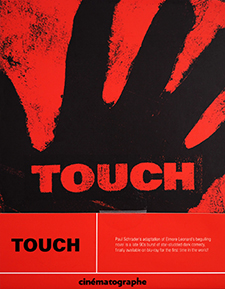Touch (1997) (Blu-ray Review)

Director
Paul SchraderRelease Date(s)
1997 (April 23, 2024)Studio(s)
MGM/UA (Cinématographe/Vinegar Syndrome)- Film/Program Grade: B-
- Video Grade: B+
- Audio Grade: B+
- Extras Grade: B+
Review
Paul Schrader’s Touch is the rare film that defies expectations on nearly every level (which may or may not be a good thing, depending on your point of view). It’s an idiosyncratic film from an idiosyncratic director, based on a novel by an idiosyncratic author. It failed to find an audience when it was released in 1997, which isn’t surprising considering that the book had also struggled to find a publisher. What is surprising is that the author in question was none other than Elmore Leonard, but nearly everything about Touch defies expectations.
Leonard was experiencing a resurgence in the Eighties and Nineties, both in terms of his literary output and also in terms of cinematic adaptations of his work. That may well be the only reason why Touch was published at all in 1987, since Leonard had actually written it ten years earlier only to have it rejected by multiple publishers. While the thought of anyone turning down a manuscript from Elmore Leonard may seem hard to believe, especially with the benefit of hindsight, his cachet wasn’t quite as strong in the late Seventies, and Touch definitely defied expectations. Leonard had built his reputation first with westerns and later with crime thrillers, but Touch is nothing of the sort. It’s a satirical yet still semi-sincere examination of religious faith and practice, and while it does contain plenty of Leonard’s trademarked pithy dialogue, the tone of the book wavers as he tries to balance the conflicting elements.
Enter a writer/director who has long been fascinated by religion and who has never been afraid of juggling conflicting elements: Paul Schrader. Schrader had been interested in adapting Elmore Leonard, though not necessarily in Touch. Yet it was the only one of Leonard’s books that hadn’t been optioned yet, and he was able to acquire the rights inexpensively (which is a good thing, because he ended up making the film for very little money). Still, the subject matter was certainly in Schrader’s wheelhouse. He’s long been fascinated by the effects of religious belief on personal behavior, and his own strict Calvinist upbringing has informed films as diverse as Hardcore, Dominion: Prequel to The Exorcist, and First Reformed. Still, satire isn’t really his natural mode of working, but he solved that problem by treating everything earnestly, Leonard’s satire included. In Roger Ebert’s 1997 review of Touch, he quoted Schrader as saying that the film has “a whole cast of ironic characters, with an existential character in the center.” That simple sentence is the key to unlocking Touch: don’t look for any balance between the elements, because Schrader never intended for there to be any. It’s a single authentic character adrift in a sea of irony.
The existential center of Touch lies in the character of Juvenal (Skeet Ulrich), an unassuming young man who has the gift of healing—a gift that he happens to perform inadvertently while manifesting the stigmata. That ends up drawing some unwanted attention from competing interests, including former evangelist huckster turned used RV salesperson Bill Hill (Christopher Walken) and the militant Roman Catholic traditionalist August Murray (Tom Arnold). Murray is a true Catholic trad who rejects the reforms of the Second Vatican Council, and he sees Juvenal as a way to return his faith to its roots. Hill, on the other hand, sees Juvenal as a way to make a quick buck. (As an aside, fans of YouTube lawyer and former Jalopnik writer Steve Lehto will be amused that Hill sells used RVs, something that’s arguably even more disreputable than selling used cars.) Hill sends his associate Lynn Faulkner (Bridget Fonda) to worm her way into Juvenal’s good graces, and she’s so taken with his ingenuousness that she ends up falling for him. That puts Juvenal, Hill, Murray, and Faulkner on a collision course with each other, one that will take a real miracle to resolve.
Oh, and the other ironic characters? Schrader may not have had much money to work with while making Touch, but he still had plenty of influence, so he managed to assemble a cast for the ages, most of whom were likely working for scale. That cast includes Gina Gershon, John Doe, Conchata Ferrell, Janeane Garofalo, Lolita Davidovitch, Richard Schiff, Paul Mazursky, Anthony Zerbe, Mason Adams, Breckin Meyer, Don Novello, O-Lan Jones, Tamlyn Tomita, and LL Cool J (as himself). As naturally outrageous as some of these actors may be, they’re all relatively restrained in Touch (with Gershon leaning into the satire a bit more than most of the others do). Yet the odd rhythms in Touch and its earnestly ironic characterizations are part of its charms. Set expectations aside, go with the flow, and there’s much here to enjoy. It’s a less-than-sincere satire about a genuinely sincere individual, and if you can accept those conflicting elements, you’ll do fine.
Cinematographer Edward Lachman shot Touch on 35mm film using spherical lenses, framed at 1.85:1 for its theatrical release. This version is based on a 2K scan of the interpositive, with digital restoration work supervised by Ryan Emerson at Vinegar Syndrome. The opening titles have a bit of horizontal waver to them, although it’s not clear if that’s due to issues with the original opticals or else wear and tear to the source. The rest of the film is stable, however, and there’s little in the way of other damage or compression artifacts visible (another solid encode from Marcus Johnson). The overall look of Touch is best described as slightly soft, and that’s not in term of the source elements, either—an IP is a more than adequate source for a 1080p Blu-ray release. No, it’s the colors and contrast, both of which are intentionally muted. The costume design, sets, and cinematography all favor soft pastel colors with relatively flat contrast. It’s not dazzling, but it’s not supposed to be, and Vinegar Syndrome’s Blu-ray reproduces that look accurately.
Audio is offered in English 2.0 DTS-HD Master Audio, with optional English SDH subtitles. Vinegar Syndrome’s packaging lists it as being the “original 5.1 theatrical soundtrack,” but it’s only 2.0 on the disc (their website accurately lists it as being Dolby Stereo instead). The closing credits do include the Dolby Digital logo, but that doesn’t prove anything. If there was a 5.1 mix, there also would have been an optical 2.0 Dolby Stereo mix on release prints as a backup. On the other hand, there may have only ever been a Dolby Stereo mix and the Dolby Digital logo was added by default. Regardless, Touch wouldn’t have gained much from a 5.1 version anyway. The dialogue and effects are largely mono, with little sonic information being steered to the surrounds. The stereo spread is mostly provided by Dave Grohl’s score (yes, that Dave Grohl—it’s his only feature film scoring credit). Touch isn’t the kind of film that needs anything more, so this a fine presentation of the original mix.
Vinegar Syndrome’s Blu-ray release of Touch is part of their Cinématographe sub-label, and is currently available in a Limited Edition of 5,000 copies. The disc itself is contained in a simple but striking clothbound Mediabook with essays by Bilge Ebiri, Chris Cabin, and Cosmo Bjorkenheim. The Mediabook is housed in a J-card slipcase with a ribbon to help remove the book (a nice touch), and the overall package design was by Haunt Love. The following extras are included:
- Audio Commentary with Steve Mitchell and Howard S. Berger
- Shelf Life: An Interview with Paul Schrader (HD – 12:34)
- Something Approaching Confrontation (HD – 12:11)
- Theatrical Trailer (Upscaled SD – 2:24)
The commentary reunites Steve Mitchell with Howard S. Berger, both of whom offer an appropriately ingenuous defense for such an earnest film. They discuss Leonard’s challenges in getting the book published, and the way that it reads like a first draft of a screenplay—something that Schrader took up, since his final script is relatively faithful to the book (although they point out a few differences). They note that Touch may seem like a tonal shift for Schrader, but it’s still thematically fitting with the rest of his filmography. It’s all about persuasion, with nearly everyone trying to sell something to someone else, so the truly sincere Juvenal is surrounded by a group of people who are pretty much full of shit. Mitchell and Berger offer plenty of praise for Schrader’s collaborators like Ed Lachman and Dave Grohl, but they reserve their most effusive praise for the impeccable casting. Christopher Walken largely keeps to his character while still incorporating a few of his famous tics, and Tom Arnold’s self-aware performance brings a certain amount of self-parody to his role. (Mitchell offers the following banger about the always wonderful Gina Gershon: “You give her the football, she’s gonna run down the field and score a touchdown.”) If you’ve never seen Touch or have never fully appreciated it, this commentary is a great way to try to get yourself in sync with its oddball rhythms.
Shelf Life: An Interview with Paul Schrader has the prickly writer/director providing his thoughts about Elmore Leonard in general and Touch in particular. His choice of the book originally came down to the fact that it was the only one that hadn’t already been optioned yet. He was interested in the fundamental contradictions in the book, calling this story about the stigmata a dirty one about bad behaviors. He found making the film to be a lot of fun, aided by the fact that he filled the cast with actors who had a comic sensibility. (Even though he had to follow Walken’s stipulation not to direct the actor too much.) He admits that there’s a disconnect between the comic elements and the nature of the stigmata, but that while the film hasn’t had a shelf life so far, he thinks that it still deserves one.
Something Approaching Confrontation is a video essay by historian and filmmaker Daniel Kremer. He turns his lens on himself as well as on Schrader, explaining that they both share a common tendency to shoehorn a religious framework into their films (one Jewish, one Christian), blending the sacred with the profane. Kremer traces the use of religion in his own films and compares it to that of Schrader, and says that Schrader’s evolution in that regard has worn many faces—a true journey.
Needless to say, Touch has been an overlooked step on that journey. It certainly hasn’t gotten much love on home video, with only VHS, LaserDisc, and DVD releases prior to this point, all of them bare-bones. So Vinegar Syndrome’s Blu-ray doesn’t just mark the first time that Touch has been available in high-definition on physical media, it’s also the first set of extras that have ever been devoted to the film. But that’s true to the mission statement of the Cinématographe sub-label: filling in the gaps in the canon of American cinema. It’s yet another great release of a film that deserves a wider audience, and hopefully it helps to give Touch the kind of shelf life that Schrader craves.
- Stephen Bjork
(You can follow Stephen on social media at these links: Twitter, Facebook, and Letterboxd).

